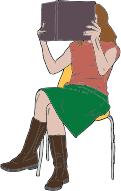Every genre has its own characteristics, and characters in novels each have their own personalities, accents, speech patterns, etc. It’s what distinguishes them from each other and makes each character unique, turning them into believable people.
YA writing goes a bit further. It’s not enough just to make your lead character – and other supporting characters – tweens or teens with particular accents and personalities; those characters need to sound, react, and think like tweens or teens. It’s all about believability.
Sometimes as adult writers, we tend to forget the painful and thrilling intricacies of youthful behavior. We need to get in touch with our younger selves and draw on all of the chaos we survived in our youth, then update it to contemporary norms.
Think back to those middle school and high school years, or think about your children’s experiences at that age. There’s drama, and lots of it. Major drama, minor drama, unnecessary drama, tearful drama, exciting drama, angry drama. Dating drama, crush drama, you-stole-my-best-friend drama. Secrets, gossip, broken hearts, lies and half-truths. Add to that all the modern drama created by social media, texting, sexting, and “unauthorized” online photos with scandalous implications, and you have a tween/teen life. Makes you wonder how anyone gets through it all!
But it does make fertile ground for novel writing. Because even though some of these same situations overlap in the adult world, reactions can be far more extreme in tweens and teens than in more logical-thinking adults. They cope and reason differently. And because they’re dealing with some of these situations for the first time, they lack the life experience that gives adults better coping and reasoning skills. They’re also working with immature thought processes, which tend to make a minor drama turn into something worthy of Rhett Butler and Scarlett O’Hara.
However, you may have to tone down the language a bit. We know that kids use plenty of foul language in their everyday speech, but it’s been shown that their parents aren’t fond of tweens reading books with heavy language. Too much of it or the use of certain words considered more offensive has been shown to cause a backlash from parents, and let’s face it, that’s where tween and teen buying power comes from. In fact, many librarians refuse to stock such books. So even though it’s realistic, it’s not always appreciated by the Those Who Hold The Purse Strings.
The best way to overcome challenges like offensive language and to get a feel for what the YA crowd is looking for is to read lots of different types of Young Adult fiction. From highly successful series to quietly successful indie books, you’ll see what’s hot and what’s not in the ever-changing world of youth.